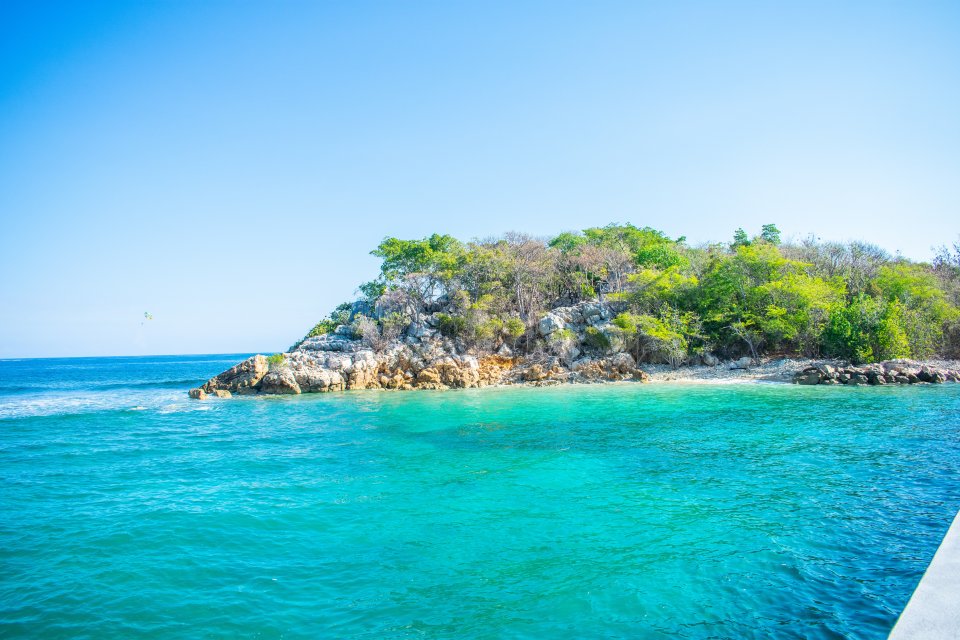
Port Salut is a small municipality in the South Department of Haiti with a population of 18,000 inhabitants, densely concentrated near the shore. The Municipality spans an area of approximately 45 km2. The most common livelihoods are agriculture, fishing, and tourism related jobs. Tourism is a growing industry, and many beachfront hotels and restaurants have been built, catering to both local and international tourists. Many fishing households have mixed livelihoods and rely on both fishing and subsistence agriculture.
The Ecosystem-based Disaster Risk Reduction (Eco-DRR) project aims to reduce disaster risks in the Municipality of Port Salut through a landscape or ridge-to-reef approach.
The project has three main components:
- Field interventions to reduce the risk of catastrophes spanning from the crest to the coral reef, including coastal revegetation as a natural buffer against coastal risks (i.e. coastal storms and floods)
- Develop local and national coastal zone management capabilities
- Support the national defense on the Eco-DRR through the management of the marine protected area.
- Establishment of a nursery that produces 137,000 seedlings of coastal and riparian species and fruit trees, for the direct benefit of 200 families
- 150 people from the Ministry of the Environment and the local community trained on the management of coastal species nurseries
- 141 hectares of reforestation in areas exposed to coastal risks and floods, consisting of:
- 54,065 fruit and forest trees planted on and around river banks to reduce soil and river bank erosion
- 36,300 mangroves and sea grape trees planted on the coast and river mouths to mitigate the risk of storm surges and floods - Sustainable vetiver farms established on 6.5 hectares for the direct benefit of 25 families
- 129 people reached in awareness-raising activities and consultations on sustainable vetiver agriculture
- Participatory action plan developed for the Port Salut fishing community which involved 51 women and men in consultations
- Boat repairs and fleet improvement (7 engines, 10 sailboats, 15 sails)
- Constitution of a disaster preparedness Plan and 30 fishermen trained on disaster preparedness and management
- Door-to-door awareness raising on Eco-DRR reaching 200 families and eight posters developed and used for public awareness and communications on the role of coastal and marine ecosystems in disaster risk reduction
- Municipal Labor-Exchange Program promoted through community-led solid waste collection along the coast to reduce marine litter and obstruction of waterways
- Municipal coordination round table set up in Port Salut and greater participation of civil society in the decision-making process on coastal zone management
- Developing climate change adaptation; improving risk management and resilience
- Better protection and restoration of coastal ecosystems
- Flood peak reduction
- Reduce flood risk
- Reduce run-off
- Restoring ecosystems and their functions
- Increase quality and quantity of green and blue infrastructures
- Creation of green jobs relating to construction & maintenance of NBS
- Increase awareness of NBS solution & their effectiveness and co benefits
- Increase communities’ sense of ownership
- Increase population & infrastructures protected by NBS
- Increase stakeholder awareness & knowledge about NBS
- Social inclusion
- Social learning about location & importance of NBS
- Sustainable development of coastal regions
The budget is USD 300.000
Further information
- 1. No Poverty
- 5. Gender Equality
- 8. Decent Work and Economic Growth
- 10. Reducing Inequality
- 11. Sustainable Cities and Communities
- 13. Climate Action
- 17. Partnerships for the Goals
